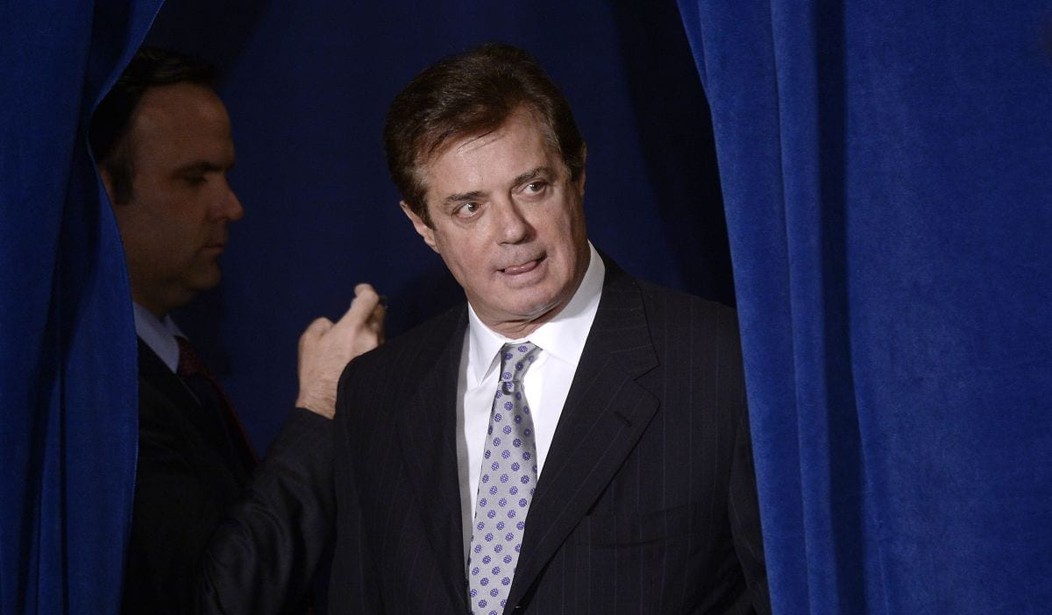The FBI’s raid on former Trump campaign chairman Paul Manafort’s Virginia home last month was “heavy-handed and designed to intimidate,” Fox News’ chief intelligence correspondent, Catherine Herridge, reported Thursday.
According to a source close to the investigation, the raid — which began while Manafort and his wife were sleeping — lasted ten hours and involved a dozen federal agents who seized documents labeled “attorney-client” in possible violation of attorney-client privilege.
The July raid was first reported earlier this month, but the new details reflect the intensity and scope of the search, which the source described as “heavy-handed, designed to intimidate.” Elements of the account were backed up by a second individual also not authorized to speak on the record.
The source said both Manafort and his wife were asleep when FBI agents entered the Alexandria, Va., condo without warning at about 6 a.m. ET. They did not conclude their search until late afternoon, around 4 p.m. ET. The 1,600-square-foot condo includes three bedrooms and a main living area.
During the raid, agents copied the electronics through a process known in law enforcement circles as ‘mirroring’ and collected records — including several documents marked “attorney-client” that included privileged material to aid Manafort’s preparation for congressional testimony, sources said.
The FBI raid came the same week Manafort appeared before the Senate intelligence and judiciary committees and provided documents on a voluntary basis.
“This is an unusual step, there is no getting around it,” former Justice Department official Tom Dupree told Fox News. “It is an aggressive step. I think it sends a very strong message both to Manafort himself and potentially other people who might be targets of this investigation that [Special Counsel Robert] Mueller is going to pursue this aggressively.”
Dupree, who served as principal deputy assistant attorney general during the George W. Bush administration and argued appeals in all 13 circuits as well as the U.S. Supreme Court, drew attention to the timing. “This is unusual because ordinarily, if you are in the process of testifying before Congress and turning documents over to Congress, you would think the prosecutors might say, ‘Well this person is cooperating and there is no need for us to go in and get a search warrant.'”
However, Dupree said, “the fact that Mueller, nonetheless, went in, got a search warrant and raided his home suggests that there is something else going on here … and it suggests that Mueller doesn’t trust Manafort or that for whatever reason he thought that if he waited for Manafort to voluntarily comply, that Mueller might not get all the evidence he wanted.”
Asked for comment, Manafort spokesman Jason Maloni referred Fox News to the following statement released earlier this month: “FBI agents executed a search warrant at one of Mr. Manafort’s residences. Mr. Manafort has consistently cooperated with law enforcement and other serious inquiries and did so on this occasion as well.”
Two former senior FBI officials, speaking anonymously, told Fox News that it is a guiding principle of the agency for agents “to use the least intrusive means possible” when seeking records. The two, however, were split on whether the number of agents used to raid the property was excessive.
Both officials, with decades of experience at the bureau, emphasized there is “nothing typical” about a special counsel probe.
In a related development, investigators are also looking into a campaign email sent by Rick Dearborn, who is now Trump’s deputy chief of staff. According to Fox, Dearborn got an offer to set up a meeting between top Trump officials and the Russian president. Dearborn, a Senate staffer at the time, was skeptical but still forwarded the email which was ultimately dismissed.
Why a minor player in the campaign forwarding an email is considered a significant development in the Russia collusion investigation is anyone’s guess, but it seems Mueller is leaving no stone unturned.
Earlier this week, the Senate Judiciary Committee held a 10-hour interview with Glenn Simpson, the former Wall Street Journal reporter whose firm Fusion GPS helped compile the salacious dossier about President Trump and Russia.
Simpson stood by his dossier but refused to identify the political clients who commissioned the controversial document.
“Mr. Simpson told Congress the truth and cleared the record on many matters of interest to congressional investigators. He also kept the identities of Fusion GPS’ clients confidential,” Josh Levy, Simpson’s attorney, told The Daily Caller in a statement.
Chairman of the Judiciary Committee Charles Grassley vowed at a town hall on Wednesday that his panel will vote on whether to release the transcripts. Grassley also suggested that it would be a good idea for the public to hear Manafort, Trump Jr., and Simpson testify on the record before his committee.









Join the conversation as a VIP Member